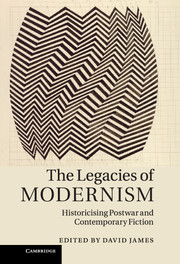Book contents
- Frontmatter
- Contents
- Notes on contributors
- Acknowledgements
- Introduction: mapping modernist continuities
- Part I Early legacies: inheriting modernism at mid century and beyond
- Part II Modernist aesthetics in transition: character, perception, innovation
- Chapter 4 Thinking in literature: modernism and contemporary neuroscience
- Chapter 5 Autonomous automata: opacity and the fugitive character in the modernist novel and after
- Chapter 6 Pseudo-impressionism?
- Chapter 7 ‘Advancing along the inherited path’: Milan Kundera, Philip Roth and the idea of being traditionally new
- Part III Reassessing the ethics of modernist fiction
- Part IV Modernism's global afterlives
- Epilogue Finding the dreadfully real
- Index
- References
Chapter 4 - Thinking in literature: modernism and contemporary neuroscience
from Part II - Modernist aesthetics in transition: character, perception, innovation
Published online by Cambridge University Press: 05 November 2011
- Frontmatter
- Contents
- Notes on contributors
- Acknowledgements
- Introduction: mapping modernist continuities
- Part I Early legacies: inheriting modernism at mid century and beyond
- Part II Modernist aesthetics in transition: character, perception, innovation
- Chapter 4 Thinking in literature: modernism and contemporary neuroscience
- Chapter 5 Autonomous automata: opacity and the fugitive character in the modernist novel and after
- Chapter 6 Pseudo-impressionism?
- Chapter 7 ‘Advancing along the inherited path’: Milan Kundera, Philip Roth and the idea of being traditionally new
- Part III Reassessing the ethics of modernist fiction
- Part IV Modernism's global afterlives
- Epilogue Finding the dreadfully real
- Index
- References
Summary
Representing mind: the anti-Cartesianism of the novel
In The Blank Slate: The Modern Denial of Human Nature (2002), Stephen Pinker argues that only a recognition of the truths of the new molecular biological sciences, and specifically evolutionary psychology, might provide any hope of future social progress. Forty years on from the original Rede lecture, ‘The two cultures and the scientific revolution’ of 1959, Pinker's argument essentially reiterates that of his predecessor, the spectroscopist and novelist C. P. Snow, and even extends Snow's fanatical earnestness in scapegoating literary modernism (and its heir, the postmodern), in a broad indictment of modern literary culture for its backward-looking indifference to science and its pernicious cultural pessimism. Pinker's vitriol against the modernist indifference to scientific truth is, however, focused, unlike Snow's, on the alleged ignorance of its practitioners about how the mind really works. His favoured target is Virginia Woolf. The attack on her begins with a misquotation – of her famous ‘on or around December 1910, human character changed’. Assuming that an author so insistent on truth would have checked his facts, the slippage from ‘human character’ to ‘human nature’ can only be viewed as a convenient means to recapitulate his subtitle and to treat with special opprobrium a writer who dares so ostentatiously to assert that ‘human nature’ changes. Woolf is arraigned, along with the ‘elite arts’ in general, as a major perpetrator of a myth of the social construction of self that is still wilfully being promulgated in defiance or denial of the scientifically objectivist understanding of human behaviour gleaned through knowledge of the now fixed and purely biological elements in hominid evolution. Woolf's psychology is deemed to rest on an outmoded and erroneous science that has produced the myth of the mind as a ‘blank slate’, responsible for the disastrous utopian social engineering that underpins the history of modernity: ‘a theory of perception that was rejected long ago: that the sense organs present the brain with a tableau of raw colours and sounds and that everything else in perceptual experience is a learned social construct’. This ‘militant denial of human nature’ reaches its apogee in the postmodern. Pinker ends more upbeat about the future, looking to a new era of biological truth in which ‘the application of the cognitive sciences and evolutionary psychology to the arts will become a growth area in criticism and scholarship’.
- Type
- Chapter
- Information
- The Legacies of ModernismHistoricising Postwar and Contemporary Fiction, pp. 75 - 95Publisher: Cambridge University PressPrint publication year: 2011
References
- 1
- Cited by



